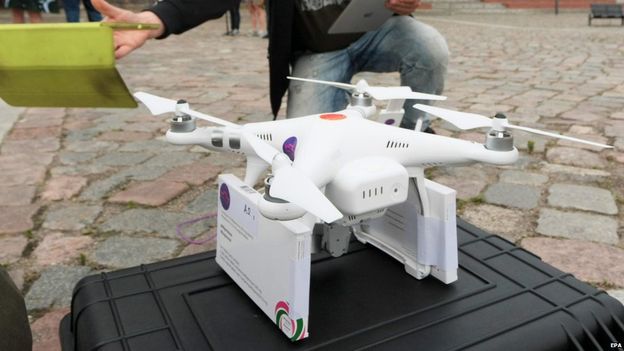
Image courtesy of CBC News
Last month, sexual and reproductive rights activists found a new use for drone technology. The Dutch NGO Women on Waves, in collaboration with other women’s rights organizations, coordinated the first “Abortion Drone”. The unmanned aerial vehicle flew packets of abortion pills from the German town of Frankfurt an der Oder to the Polish town of Slubice.
The drone delivered mifepristone and misoprostol, which are typically used for medical abortions. In general, the pills can be taken through the 9th week of a pregnancy. They can be taken without supervision by health professionals and have been demonstrated to be both safe and effective.
Both medications have been on the World Health Organization’s (WHO) list of essential medicines since 2005. Some of the decline in maternal deaths due to complications of unsafe abortion between 2003 and 2008 (from 66,500 in 2003 to 47,000 in 2008) appears to be from more women using medical abortion pills to terminate pregnancy on their own.
These pills have been approved for use in most European countries. In Poland, however, women can only access an abortion in very limited circumstances. Poland’s restrictive abortion law allows women to obtain an abortion only when:
- The life or the health of the pregnant woman is in danger;
- The pregnancy is the result of a criminal act (such as rape or incest); or
- There are serious fetal abnormalities.
In practice, however, Polish women are often unable to obtain even the abortions to which they are legally entitled. It is estimated that at least 50,000 underground abortions take place in Poland each year. And the doctors who perform abortions illegally often use outdated tools and procedures.
According to Rebecca Gomperts, the founder of Women on Waves: “In Poland, even women who could have an abortion under Polish law are often denied it because Catholic hospitals don’t help them, even if their life is in danger. Rich people can go to Germany or the UK to have abortions, but it’s the women who don’t have the means or access to information who are suffering.” In coordinating the drone delivery of abortion pills, Women on Waves sought to draw attention to the social injustice caused by Poland’s restrictive abortion laws.

Image Courtesy of BBC News
This new strategy for delivering medical abortions to women does not appear to violate national or international law. The drone operation did not require authorization from either country’s government, as it flew through controlled airspace, was not used for commercial purposes and weighed less than 5kg. A doctor prescribed the medications in Germany, where medical abortions are permitted. And since Poland only criminalizes doctors who perform illegal abortions, not women who terminate their own pregnancies, a woman cannot be held liable for taking the medication there. The German police threatened to press charges (presumably against those who flew the drone) but the grounds for such charges remain unclear.



